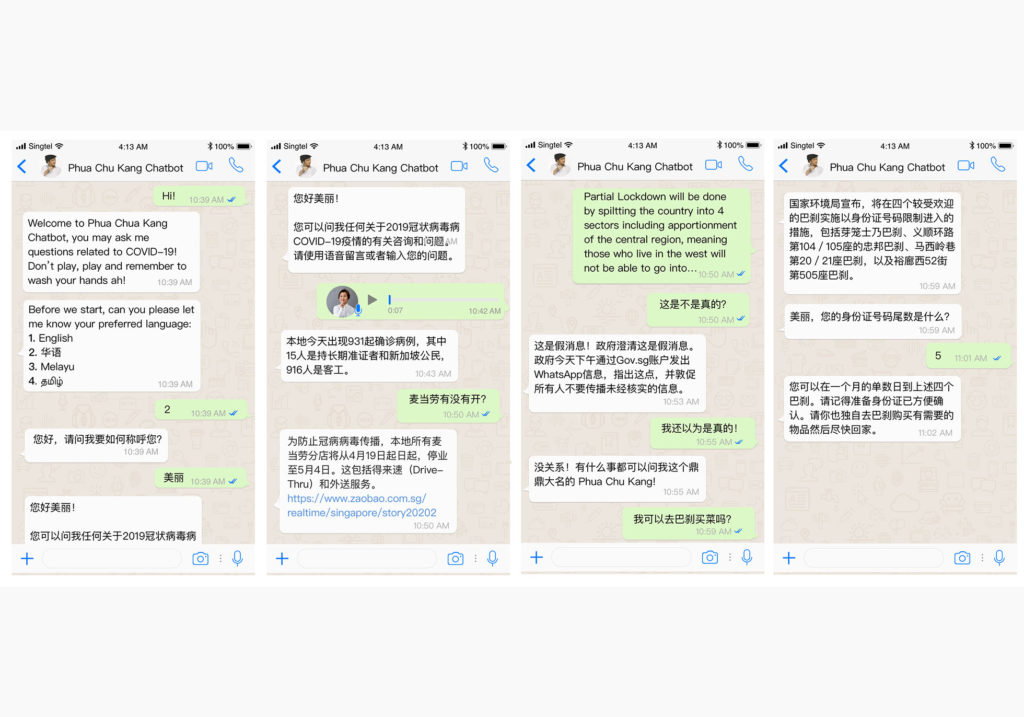
Design Challenge
#1: How might we keep our communities in Singapore safe and healthy during the global COVID-19 pandemic?
Project Description
During Covid, the amount of information can be overwhelming with frequent changes in regulations, sometimes even on a day-to-day basis. We spoke with 6 interviewees who are above 50 years old to understand how they access, evaluate and share information during this period. In this project, we explore how we might help them gain confidence in the information they received, without increasing the number of sources.
Phua Chu Kang Chatbot aims to allow seniors to discern fake news quickly and conveniently just by sending in a Whatsapp message to “Phua Chu Kang”, a mental model which users are already familiar with. This will reduce the barrier to adoption and learning curve. Utilizing AI, the chatbot can recognize and respond to voice or text inputs by users, in any of the four languages.
Criteria #1: Value
Our research shows that news and government websites are judged as the most reliable sources of information. When in doubt, seniors often turn to their family to verify accuracy of information.
“Sometimes, it’s hard to tell if something is true, such as the news about lockdown by regions…”
“I will ask my husband. He knows better.”
The Whatsapp chatbot aims to empower seniors to ask questions related to COVID19 or even pasting links of information which they would like to seek clarification. This reduces dependence on others for verification and through the process, gain competency in differentiating fake news.
Criteria #2: Inspiration
While seniors are able to access information through news and official websites, they don’t have an official channel to go to verify any piece of information.
Our Whatsapp chatbot aims to fill that gap and provide an easy and convenient channel for seniors. Many are not familiar with new apps or functions and rely on the younger generation to teach them. By using Whatsapp, we can tap on a mental model that users are already very familiar with, reducing the barrier to adoption. They can also choose to send voice or text messages, and in their preferred language as well.
Criteria #3: Impact
Sharing information with family and friends is a common behavior amongst our interviewees, and this is often done without verification.
“I share news to update on the severity of the situation but I guess they also know.”
By allowing users to verify accuracy of information, we can alleviate their concerns and help them discern fake news before they share with others. On a broader level, the questions received can surface fake news which can then be eradicated. The tool can also be used by anyone who wants a quick and fuss-free way to verify official information, even beyond Covid period.
Criteria #4: Timeliness
Month 1-2: Test idea with a MVP, using Whatsapp with a live chat. Carry out user adoption, education and build up content for the chatbot, in four languages.
Month 3: Design chatbot prototype with rigorous user testing and iteration with further research. Given that we do not have capabilities in building a chatbot, we hope to work with IMDA or experts in this area.
Month 4: Launch full chatbot, but continue to collect data on questions and conversational UI for machine learning.
Criteria #5: Systems Thinking
Currently, there are many sources of information, official ones including news, government websites, subscriptions, and apps. While these are regarded as the most reliable sources, there is no avenue for the public to verify information. Our chatbot addresses this gap by allowing people to submit their queries to a trusted and authorized account, and get immediate verification.
We would also require large amount of data from official sources and users to harness machine learning. Hence, we hope to collaborate with IMDA on this project. This would also lend credibility to the account and increase user’s confidence in the results.
